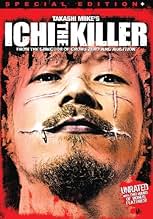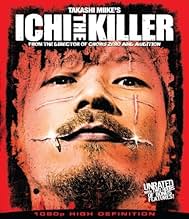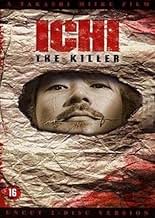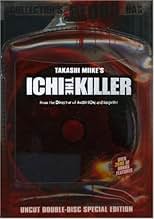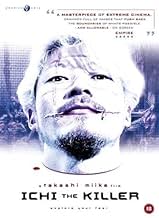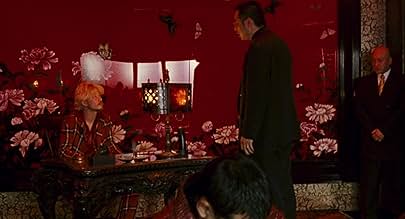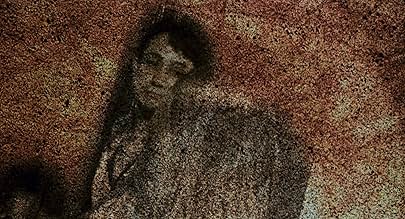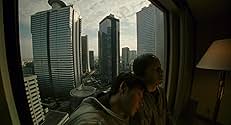AVALIAÇÃO DA IMDb
6,9/10
63 mil
SUA AVALIAÇÃO
Quando Kakihara, um executor sadomasoquista da yakuza, procura seu chefe desaparecido, ele conhece Ichi, um assassino psicótico reprimido que pode infligir níveis de dor que Kakihara sonhava... Ler tudoQuando Kakihara, um executor sadomasoquista da yakuza, procura seu chefe desaparecido, ele conhece Ichi, um assassino psicótico reprimido que pode infligir níveis de dor que Kakihara sonhava em conseguir.Quando Kakihara, um executor sadomasoquista da yakuza, procura seu chefe desaparecido, ele conhece Ichi, um assassino psicótico reprimido que pode infligir níveis de dor que Kakihara sonhava em conseguir.
- Direção
- Roteiristas
- Artistas
- Prêmios
- 6 vitórias e 4 indicações no total
- Direção
- Roteiristas
- Elenco e equipe completos
- Produção, bilheteria e muito mais no IMDbPro
Avaliações em destaque
This has to be one of my greatest experiences in the Asian cinema. I have been watching Asian movies since the eighties where I saw my first martial arts movies and I have been an Asian fan ever since.
They have a unique way of making movies and a boldness you don't see in western cinema. I have a few friends that share my sick fascination in the gory and shocking side of Asian movie making and Ichi the killer is the best in it's genre. I have seen a lot of Miike's movies which I won't mention here but Ichi is by far my favorite Miike movie.
Takashi Miike spits out movies faster than speeding bullets and some of his works are not even worth watching. But once in a while he hits the spot and delivers a masterpiece and Ichi is by all means a masterpiece. A lot of people only see the blood, torture, gore and humiliation of the human body in Miike's movies but mostly he has a hidden or at least partly foggy agenda.
Ichi is basically a film about a loyal yakusa henchman trying to find meaning in his life after his boss has been murdered and a murderer trying to find himself in a labyrinth of deception and lost memories. It is well played and very well made.Tadanobu Asano excels as Kakihara and Nao Omori is extremely good as the violent insane killer Ichi. The special effects has a realistic feel about them and you can almost feel the pain inflicted in this movie and there is plenty of pain to go around.
Ichi is not a film for people with weak nerves or a dislike for blood. Miike likes to shock his audience and is a master in this field. He delivers the meat for the gore hounds and has a weird sense of humor....
I give this little blood feast a 8.0
They have a unique way of making movies and a boldness you don't see in western cinema. I have a few friends that share my sick fascination in the gory and shocking side of Asian movie making and Ichi the killer is the best in it's genre. I have seen a lot of Miike's movies which I won't mention here but Ichi is by far my favorite Miike movie.
Takashi Miike spits out movies faster than speeding bullets and some of his works are not even worth watching. But once in a while he hits the spot and delivers a masterpiece and Ichi is by all means a masterpiece. A lot of people only see the blood, torture, gore and humiliation of the human body in Miike's movies but mostly he has a hidden or at least partly foggy agenda.
Ichi is basically a film about a loyal yakusa henchman trying to find meaning in his life after his boss has been murdered and a murderer trying to find himself in a labyrinth of deception and lost memories. It is well played and very well made.Tadanobu Asano excels as Kakihara and Nao Omori is extremely good as the violent insane killer Ichi. The special effects has a realistic feel about them and you can almost feel the pain inflicted in this movie and there is plenty of pain to go around.
Ichi is not a film for people with weak nerves or a dislike for blood. Miike likes to shock his audience and is a master in this field. He delivers the meat for the gore hounds and has a weird sense of humor....
I give this little blood feast a 8.0
Takashi Miike's "Ichi the Killer" is a masterpiece of insane cinema.This film is surely challenging-filled with enough sadistic violence and rape to satisfy fans of Japanese harrowing cinema.It's based on the popular manga by Hideo Yamamoto.The character of Ichi is truly amazing-he is a mysterious figure who slices various individuals into numerous bloody pieces with razor sharp blades strapped to his boots.The gore is pretty extreme as Ichi literally slices people in half with his razor-sharp boots.The acting is surprisingly good-Nao Omori and Tadanobu Asano are impressive as Ichi and Kakihara.Highly recommended,especially if you have strong stomach.9 out of 10.
Ichi (Nao Omori) is a disturbed and brainwashed killing machine who dresses up in a superhero costume and is controlled by his mentor named Jijii (Shinya Tsukamoto).
Kakihara (Asano Tadanobu) is a sadistic gangster who loves three things: giving and being given pain and looking for the killing machine named Ichi, the person who killed his boss and ran away with his three-hundred million yen. His quest with looking for the mysterious Ichi causes the streets to become a battleground with the gangs of Shinjuku. As the film goes by, the battle with the gangs of Shinjuku becomes more gory than ever.
ICHI THE KILLER is a rare film that we get these days. It contains good cartoon like violence, humour so black yet it would make people laugh, an awesome soundtrack and great makeup effects. Sure, it may not be for everyone but for those that are open-minded or are Miike fans and want to watch something different, this film would be for them.
Kakihara (Asano Tadanobu) is a sadistic gangster who loves three things: giving and being given pain and looking for the killing machine named Ichi, the person who killed his boss and ran away with his three-hundred million yen. His quest with looking for the mysterious Ichi causes the streets to become a battleground with the gangs of Shinjuku. As the film goes by, the battle with the gangs of Shinjuku becomes more gory than ever.
ICHI THE KILLER is a rare film that we get these days. It contains good cartoon like violence, humour so black yet it would make people laugh, an awesome soundtrack and great makeup effects. Sure, it may not be for everyone but for those that are open-minded or are Miike fans and want to watch something different, this film would be for them.
Be warned - as early as the film's titles - letters rising from fallen sperm - (The costumed killer ejaculated voyeuristically watching violence done by one of the other team of gangster killers). You should either run screaming from the theater or stay for an over-the-top exercise in so much violence it becomes white noise and almost disappears. Seen at the Cinematheque, here in Los Angeles, with an adult crowd - this unrated but surely X-cubed film was a delight to those who stayed A few patrons fled in the middle of the screening but most got the point. Bad guys pursuing bad guys - with genre formula being trashed at every point - the humor built and built. Any good characters (children included) were decimated or tortured. None were spared. Yet the film is a romp - from the complaining co-workers who grumble about having to clean up blood-drenched murder scenes (they found intestines everywhere) to the sado-masochistic special effects. The film has left turns into fantasy - then back again - it has intentional bad-acting scenes (from previously capable actors)- the camera work has a will of it sown - exposition that makes no sense.
This film posits the questions: If you are going to be a bad-boy film director and take screen violence as far as it can go - no farther than that - NO REALLY FARTHER THAN THAT - to the point of blood almost every minute - what would the result be? Apparently the director feels that on the far side of excess violence and blood letting in glorious technicolor and grotesque special effects, the cinema would revert to a twisted sense of innocence (beyond all that killing there is a comic sense of the universe).
A film that should be seen - but you should be prepared for it. Not a classic - but a definite statement - more a cinema-artist's statement than a traditional film. Museums will find a place for it - families will abhor it.
I got into it to my amazement. It stretched my mind about what should be so.
This film posits the questions: If you are going to be a bad-boy film director and take screen violence as far as it can go - no farther than that - NO REALLY FARTHER THAN THAT - to the point of blood almost every minute - what would the result be? Apparently the director feels that on the far side of excess violence and blood letting in glorious technicolor and grotesque special effects, the cinema would revert to a twisted sense of innocence (beyond all that killing there is a comic sense of the universe).
A film that should be seen - but you should be prepared for it. Not a classic - but a definite statement - more a cinema-artist's statement than a traditional film. Museums will find a place for it - families will abhor it.
I got into it to my amazement. It stretched my mind about what should be so.
I wish somebody would clone Takashi Miike. This man churns out gory masterpieces with speed and consistency not seen since the 1970s giallo boom. Ichi The Killer is the movie that brought Miike to international attention and it still holds up as one of the filthiest exercises in film-making that I have had the pleasure to watch.
Quentin Tarantino has earned millions ripping off Asian genre classics, so it makes a nice change to see an Asian director take some inspiration from him. Ichi The Killer has clearly been influenced by "Pulp Fiction" and "Reservoir Dogs" in both content and construction. However, Miike takes things to a new level both stylistically and through his mind blowing use of violence. This is one of those films that has to be seen in its uncut form, preferably without the hideous cockney dubbing.
The film follows Kakihara, a Yakuza assassin, on his mission to avenge his boss' murder. After a few false turns, Kakihara learns that Ichi was responsible for the killing and faced with the extent of Ichi's butchery, comes to believe that he may just have met his match in the sadism stakes. Miike expertly weaves several subplots into the film, all of which have the common element of being bloody. As captivating as the story is, it is the breathtaking violence that sets this film apart. Miike splashes blood like an artist uses paint. One of the most striking examples is Suzuki's torture, which sees him suspended on hooks, pierced with skewers and covered with boiling oil. Luckily for gorehounds, Miike is just warming up. This film contains enough blood and severed limbs for two horror movies.
Miike directs the film with his usual sense of style and flair. His affinity for all things surreal is given expression in Kakihara's fist swallowing scene and Jijii's pre-murder bodybuilding poses. The film also has a healthy dose of black humour, largely thanks to Kakihara's masochism. The actors are uniformly excellent, with Tadanobu Asano particularly brilliant as Kakihara. The only significant fault with the movie is the character of Ichi himself, who seems under-developed in comparison to his more interesting Nemesis Kakihara. There is also a slight lull in the film when it explores the ex-policeman's relationship with his son. However, these are small complaints and do little to detract from the film's many great qualities.
Ichi The Killer is subversive film-making at its best. Takashi Miike has carved himself a unique place in world cinema. The astonishing thing is that he keeps on coming up with the goods, time and time again.
Quentin Tarantino has earned millions ripping off Asian genre classics, so it makes a nice change to see an Asian director take some inspiration from him. Ichi The Killer has clearly been influenced by "Pulp Fiction" and "Reservoir Dogs" in both content and construction. However, Miike takes things to a new level both stylistically and through his mind blowing use of violence. This is one of those films that has to be seen in its uncut form, preferably without the hideous cockney dubbing.
The film follows Kakihara, a Yakuza assassin, on his mission to avenge his boss' murder. After a few false turns, Kakihara learns that Ichi was responsible for the killing and faced with the extent of Ichi's butchery, comes to believe that he may just have met his match in the sadism stakes. Miike expertly weaves several subplots into the film, all of which have the common element of being bloody. As captivating as the story is, it is the breathtaking violence that sets this film apart. Miike splashes blood like an artist uses paint. One of the most striking examples is Suzuki's torture, which sees him suspended on hooks, pierced with skewers and covered with boiling oil. Luckily for gorehounds, Miike is just warming up. This film contains enough blood and severed limbs for two horror movies.
Miike directs the film with his usual sense of style and flair. His affinity for all things surreal is given expression in Kakihara's fist swallowing scene and Jijii's pre-murder bodybuilding poses. The film also has a healthy dose of black humour, largely thanks to Kakihara's masochism. The actors are uniformly excellent, with Tadanobu Asano particularly brilliant as Kakihara. The only significant fault with the movie is the character of Ichi himself, who seems under-developed in comparison to his more interesting Nemesis Kakihara. There is also a slight lull in the film when it explores the ex-policeman's relationship with his son. However, these are small complaints and do little to detract from the film's many great qualities.
Ichi The Killer is subversive film-making at its best. Takashi Miike has carved himself a unique place in world cinema. The astonishing thing is that he keeps on coming up with the goods, time and time again.
Você sabia?
- Curiosidades(at around 18 mins) For the sequence based on the part in the manga during chapters 13-16 of volume 2, where a naked Susuki of the Funakigumi is tortured by being suspended from meat-hooks. Susuki's actor Susumu Terajima required twelve hours of makeup and other preparation, and then spent twelve more hours shooting the scene.
- Erros de gravação(at around 1h 30 mins) When Kakihara is attacked in the streets, protective padding is visible under his clothing. Look for it when he bends over backwards without falling over, before he removes his piercings.
- Cenas durante ou pós-créditosEnd credits scroll up, down, left, right, forwards and backwards.
- Versões alternativasThe French DVD is the full uncut version
- ConexõesFeatured in The Cult of Ichi (2007)
Principais escolhas
Faça login para avaliar e ver a lista de recomendações personalizadas
Detalhes
Bilheteria
- Orçamento
- US$ 1.400.000 (estimativa)
- Faturamento bruto nos EUA e Canadá
- US$ 20.285
- Fim de semana de estreia nos EUA e Canadá
- US$ 2.750
- 12 de nov. de 2017
- Faturamento bruto mundial
- US$ 80.631
Contribua para esta página
Sugerir uma alteração ou adicionar conteúdo ausente


